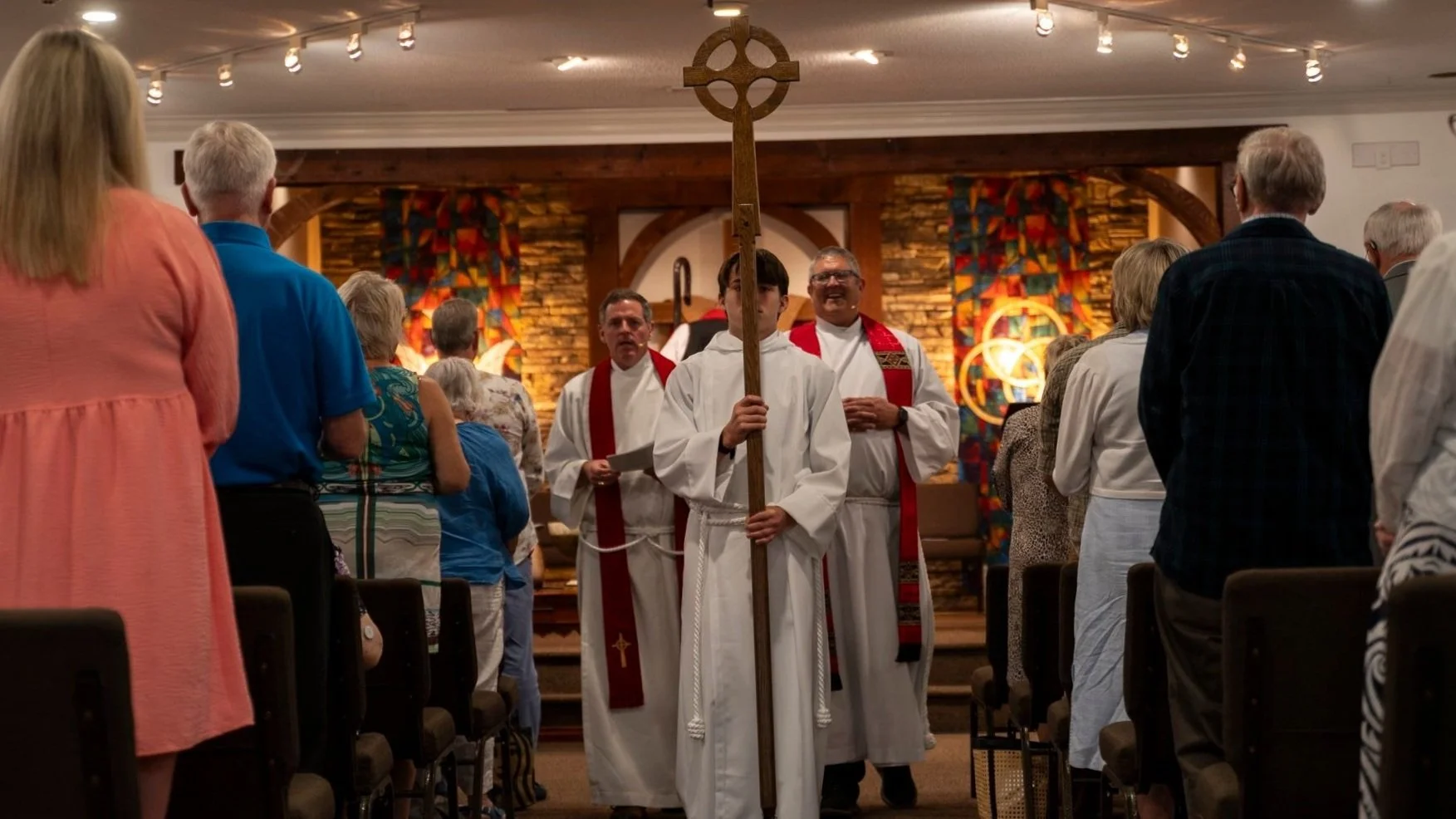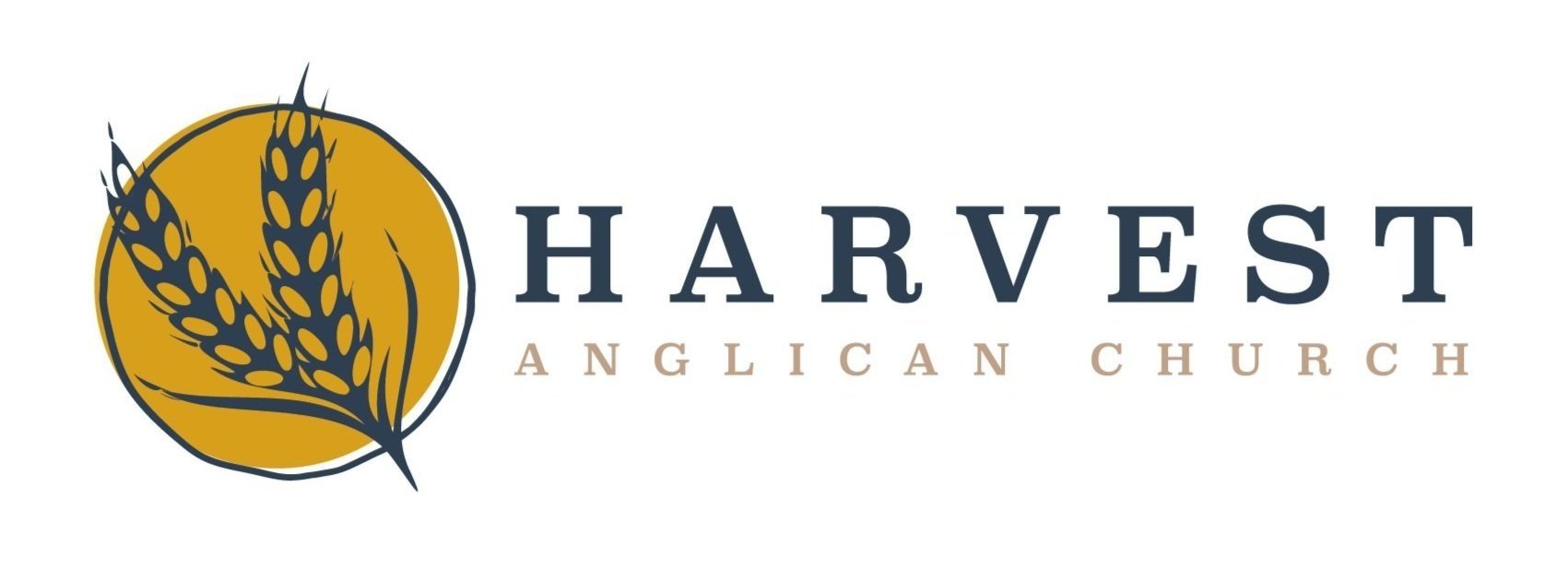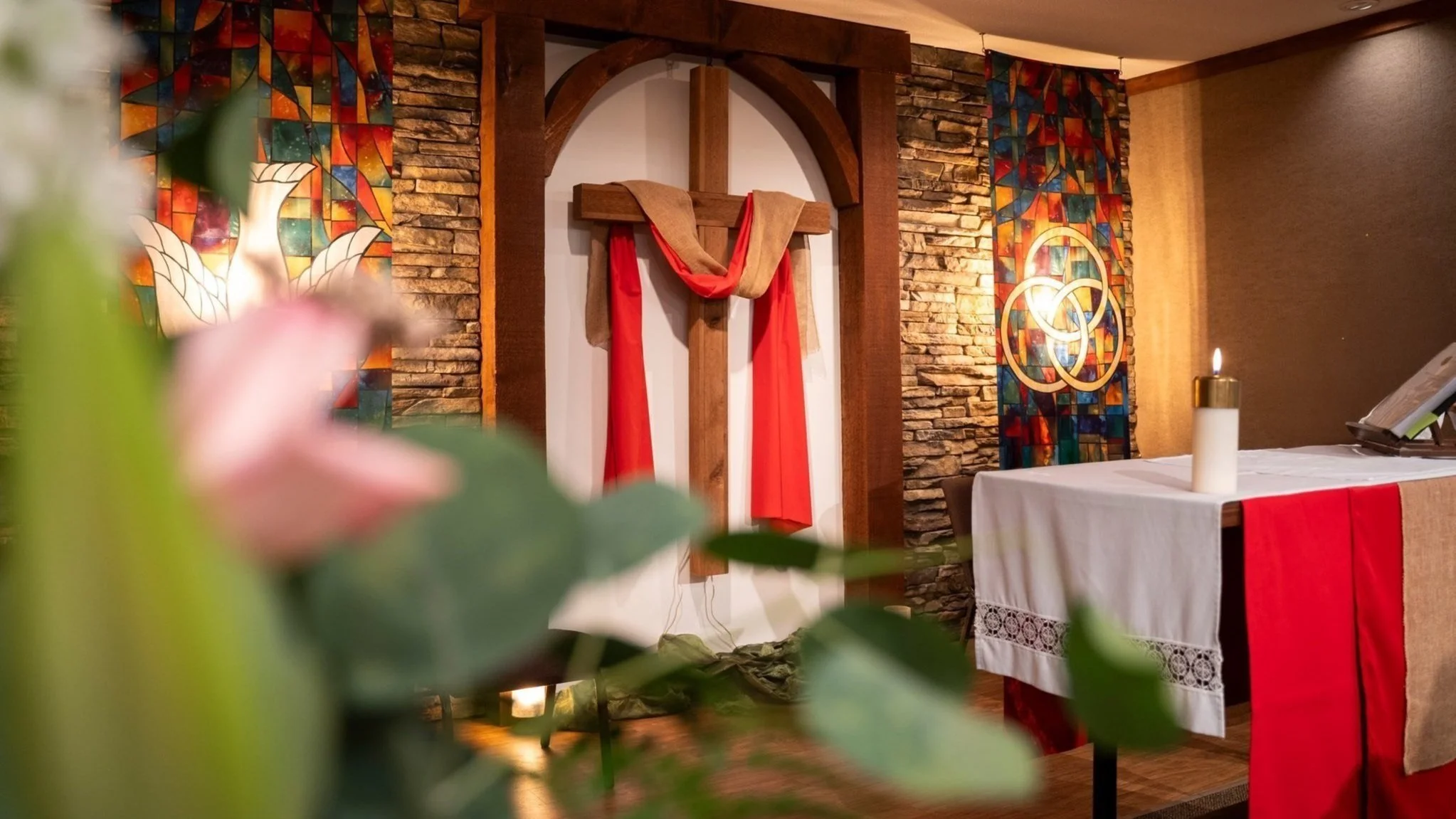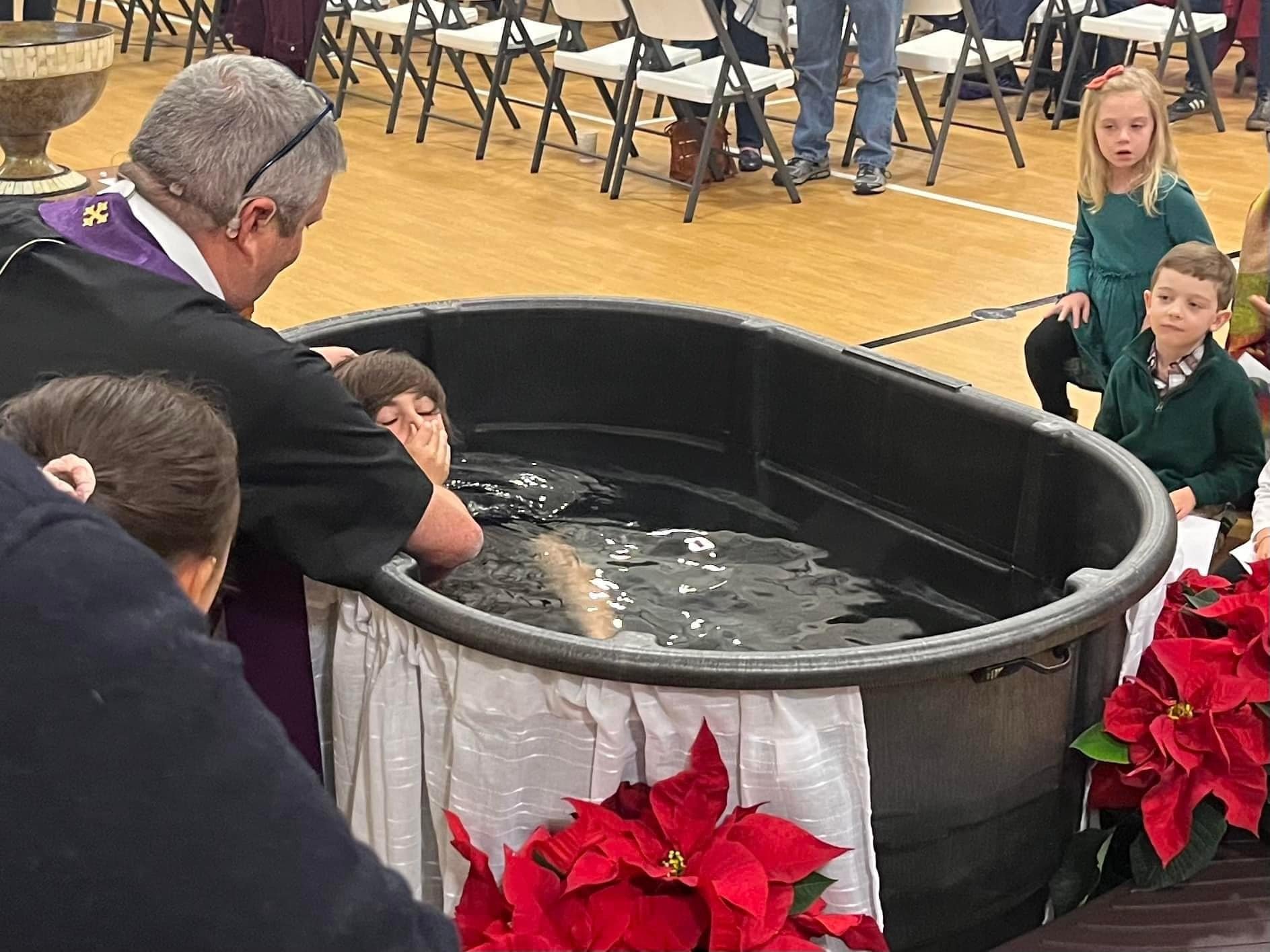
Harvest is an ever-ancient, ever-new church for the greater Simpsonville area! We hope you will come and see what God is doing in and through the ministry of Harvest Anglican Church. Our service is on Sundays at 10:30 am! See other important details below:
what to expect
Come and see! Scripture. Sacrament. Spirit.
A parking lot view of the front entrance of the church. NOTE: All handicapped guests will be parked up here because the entrance sidewalk to the sanctuary is pictured at the right and goes around the front of the chapel.
A view of our parking lot in the back. You’ll head toward the pavilion (pictured) and there is a ramp leading up to the back entrance to the church where a greeter will meet you.
A picture of our worshiping family. We are both reverent and expressive in our worship.
Celebrating the Eucharist every Sunday is essential to us at Harvest as we are met by Christ and fed at his Table.
Holy Baptism is one of the Sacraments we celebrate in the Church either by the pouring on of water, or by full submersion in water.
Baptism by submersion
We are a church that began in late 2021, but by the grace of God, we have now grown and purchased our own church property. We are located at 1636 Bethel Road, Simpsonville and worship every Sunday morning at 10:30 am.
When you arrive on campus, please park in one of the front spaces as our guest if you like. Overflow parking is in the back beside our beautiful outdoor pavilion. If you park up front, you’ll head into the main entrance where you can check in and get a name tag if you like. If you park in the back, there is a ramp from the pavilion to the church. From either entrance, a greeter will hopefully show you where to go to the sanctuary, pastry & hospitality area, or the nursery/cry room. **If you have children who will be going to Kids Church (see below), you will need to visit the Check-In station at the front entrance of the church to get a security label. It just takes a few minutes, but if you would like to save time and pre-load your children’s information, you are welcome to do so HERE.
Speaking of kids… Children are always invited to worship with us because children need to learn how to worship the Lord from their parents and others. We love the little children because Jesus does! We do ask parents to be mindful of other worshipers if their children get too wiggly and fussy. If that happens, we invite the parent(s) to hang out with their kids in either the downstairs nursery/cry room on the 1st floor or the upstairs Fellowship Hall. **Video and Audio from the service is piped into either place, so parents can continue to watch and listen to the service while the children play more freely. An usher will be glad to guide you to either space. We also have activity bags in front entrance lobby.
Lastly, If you choose, after the opening songs of worship and prayer, children (from K4 - 3rd grade) may go to Kids Church with our Children’s Director and trained/safety screened volunteers for a time of biblical learning, crafts and lessons during the sermon and prayers of the people (30-35 minutes). The children always return to us for Holy Communion during the Passing of the Peace!
Musically, the worship service is geared toward Colossians 3:16 (singing psalms, hymns, and spiritual songs to God). Harvest uses an acoustic ensemble consisting of vocals, piano/organ, cello, percussion, bass, and acoustic guitar and we offer a fantastic mix of both traditional hymns and modern participatory songs that exalt God and tell the story of salvation in Jesus.
We worship in the liturgical tradition of the Anglican Church (and “liturgy” simply means participatory worship service…or a “work of the people” so don’t let the word ‘liturgy’ scare you). We follow the 2019 Book of Common Prayer “Ancient Renewed Text” Eucharistic service pretty closely —which includes participatory elements of worship such as responsive Acclamations, ancient Creeds/statements of faith, Scripture readings, corporate prayer, and a biblical sermon. Of course, celebrating the Eucharist (Communion) every week is very essential to us as it is the climax of our service—when Christ meets us at his Table.
If this is new to you, we are convinced that you just need to come and see for a season. Come with an open heart and mind, and experience the depth, richness and beauty of Christian worship in the Anglican tradition. You’ll find that it is a very fresh and meaningful encounter with God the Father, and the Son, and the Holy Spirit.
FAqs
-
Harvest is a church within the Anglican Church of North America (ACNA) and the Diocese of the Carolinas. While its origins began in England in the first few centuries of the early Church, Anglicans are now a global communion of over 80 million fellow Christians! If you were to search out the word "Anglican" online, you will see that there are different expressions of Anglicanism around the world. Harvest Church leans more "blended" in style while still being rooted and grounded in ancient Christian practice, belief and tradition. Very importantly, because some Anglican communions around the world have wandered away from the gospel and the authority of scripture (including the Church of England and the Episcopal Church in the United States), Harvest aligns theologically and is in a covenant relationship with our global Anglican brothers and sisters in Christ who adhere to the scriptures and the historical teachings of the Church and are a part of GAFCON.
-
We encourage you to dress as nicely as you want or as casual as you want! We do ask that all outfits worn be appropriate for worship. You can peruse around the website and get a better feel for how we dress by looking at some pictures and by watching the videos.
-
What do you have for kids?
Our children are precious to us and we will do everything we can to teach them the ways of the Lord and to increase their love, wisdom, and knowledge of Jesus. He loves the little children and so do we! Our prayer is that our children experience the love of God so powerfully that they will be passionate disciples of Jesus as they grow up! On Sundays, we have an infant nursery and cry room with audio piped in from the service if you’d like to check your infants/toddlers in or if your children get fussy during the service. We welcome children to worship with us but we do ask that you be mindful of others should they get restless. We have activity bags for those who need them as well in the Gathering Spot out front. We offer Harvest Kids Church for those K4-3rd grade where if the parents choose, they can be dismissed for about 30-35 minutes of Bible teaching, Bible study, crafts and games on their level during the sermon. They will return later to celebrate Holy Communion with us. We also aim to get them involved in worship sometimes as well! Regardless, it's really important to us that children learn how to worship and serve the Lord from the youngest of ages. When you arrive, be sure to "check-in" up front to receive a security label for you and your child. You can pre-register them [HERE]
-
Yes. No matter what tradition or denomination you may come from, the Communion Table is open to ALL who have been baptized and belong to Christ (including baptized children if they are able to receive it reverently). This is a family meal for those who love Jesus, and KNOW they need Jesus—it is not for people who have it all "figured out" because we are ALL a work in progress! If you or your children have not been baptized yet, we still want to pray a blessing over you and so please come forth and just cross your arms across your chest. This will signal us to pray. And of course, we invite you to learn about baptism and become a part of the family of Christ!
Come to the Table! All you are thirsty, all who are hungry! And be filled!
-
Baptism is a sacrament that is essential to the Christian faith and occurs when a candidate is publicly immersed in or has water poured or sprinkled on them in the name of the Father, the Son, and the Holy Spirit. Baptism is a sacrament that Christ commanded us to do when he sent us forth to "Make disciples of all nations; baptizing them in the name of the Father, Son, and Holy Spirit..." and it carries with it multiple meanings: (1) the believer has received forgiveness of sins and (2) the believer now has a new life in Christ. Baptism is a mysterious 'means of grace' (a place where God's real presence meets us in ordinary things, like water).
Through baptism, we are publicly initiated and adopted into God's family and into Christ's Holy Church. Through water and the mysterious work of the Holy Spirit, we are sealed and marked as Christ's own forever. We like to say that the waters of Baptism are an 'outward and visible sign of an inward and spiritual grace' (work of the Spirit). Because it is God's grace alone that calls us and convicts us of our sin, need for repentance, and a Savior, we believe Baptism is not something we do on our own - Baptism is something God does IN and FOR us. In other words, baptism is a sacrament of "divine inititative, not of human activity" (John Stott).
What about baptizing infants? This is a huge topic that many have wrestled with for centuries because the Bible is not emphatically clear on the subject. However, there are some churches today that believe the only valid mode of baptism is 'believer's baptism': which is by submersion under water and where someone is old enough to profess their Christian faith. But, historic traditions like Anglicans and most other faith traditions know that infant baptism has been the primary mode of baptism (by either submersion, pouring or sprinkling of water) among Christians for more than two thousand years of church history. We strongly believe that baptizing infants is a good and pleasant thing in the eyes of the Lord Jesus who said himself, "Let the little children come to me, and do not hinder them, for the Kingdom of God belongs to such as these" (Matthew 19:14).
Again, baptizing infants goes back to the early church, and it is highly probable that new converts who were baptized in the New Testament, whose "whole families" were baptized (see Acts 16:33), were families that certainly included infants and children! Infant baptism is also rooted in rich history and traces its origins to the ritual of circumcision from the Old Testament covenant. Following the example of Abraham (see Genesis 17:9-14; 22-25), every male child born to an Israelite was to be circumcised (Lev. 12:3) as a sign of God's covenant of grace. But, we believe that when Christ established a new covenant, baptism replaced circumcision as the sign that marked infants as children of the covenant. This is why Paul connects circumcision and baptism in Colossians 2:11-12...because circumcision and baptism are both signs of God's covenant to his chosen people and precede an infant's ability to choose to speak for themselves.
Lastly, as with most faith traditions, infants who are baptized must have a family and/or godparents (along with the congregation) who are Christians themselves, and will publicly speak for the child as a member of a local congregation. All members and family who are present at this worship service, will publicly promise to raise that child in the faith until they reach an age where they are able to articulate and understand the Christian faith and accept it for themselves (Deut. 6:6-9, Proverbs 22:6, Mark 2:3-5, Acts 2:39, Acts 16:25-34). Therefore, when a person reaches an age where they feel ready, they will go through a season of teaching of the basic Christian tenets of faith by our clergy that is called Confirmation. When complete and ready to be confirmed, they will stand before the bishop in a public worship service in the midst of the congregation and be prayed over and brought in as a full member of the Church. It is a powerful moment! Some choose to be baptized in this service!
When you are ready to begin a new life in Christ, and be initiated into the family of God in the Church, we invite you to come -- be baptized in the name of the Father, Son, and the Holy Spirit! We cannot wait! Email us to set up a date!
Listen to recent sermons.








